Patriarch Bartholomew in Kyiv: the first statements and conclusions
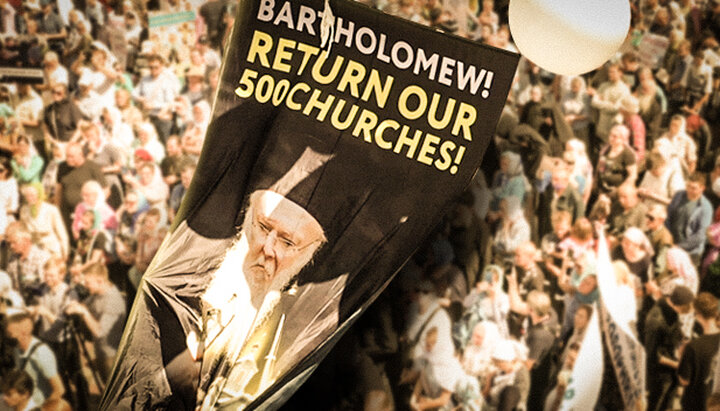
The Phanar head in Ukraine. He meets with the country's leadership, speaks at the forums of veterans but runs away from meeting with UOC believers. What is next?
The head of the Phanar arrived in Ukraine, met with the top leaders of the state and refused to look into the eyes of people who suffered from the "love of the Mother Church". What do the first steps of Patriarch Bartholomew on our land suggest, and how can the situation develop further?
Political project in violation of the Constitution
On August 20, 2021, the plane with the head of the Phanar landed at the Boryspil airport, where he was met by Prime Minister Denis Shmyhal and the head of the OCU Sergei (Epiphany) Dumenko.
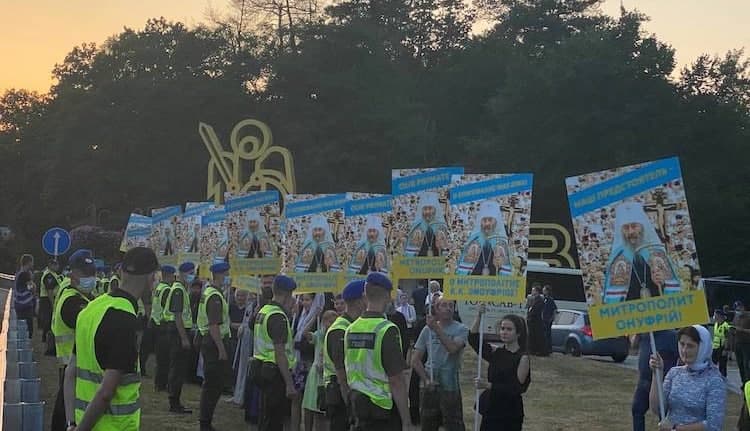
According to the Constitution of Ukraine, the Prime Minister is the third person in the state in terms of status, and in accordance with diplomatic practice, prime ministers meet heads of foreign states at airports, and even then not all and not always. For example, on August 22, 2021, D. Shmyhal did not meet German Chancellor Angela Merkel in Boryspil.
“A symbolic and important visit for our state. The delegation of the Ecumenical Patriarchate will take part in the celebrations for the 30th anniversary of the restoration of our independence. I thanked for the support provided to Ukraine and the Ukrainian people by His Holiness,” D. Shmyhal wrote on his Telegram channel after meeting the Phanar head.
Immediately after arriving in Kiev, Patriarch Bartholomew went to a meeting with President of Ukraine V. Zelensky.
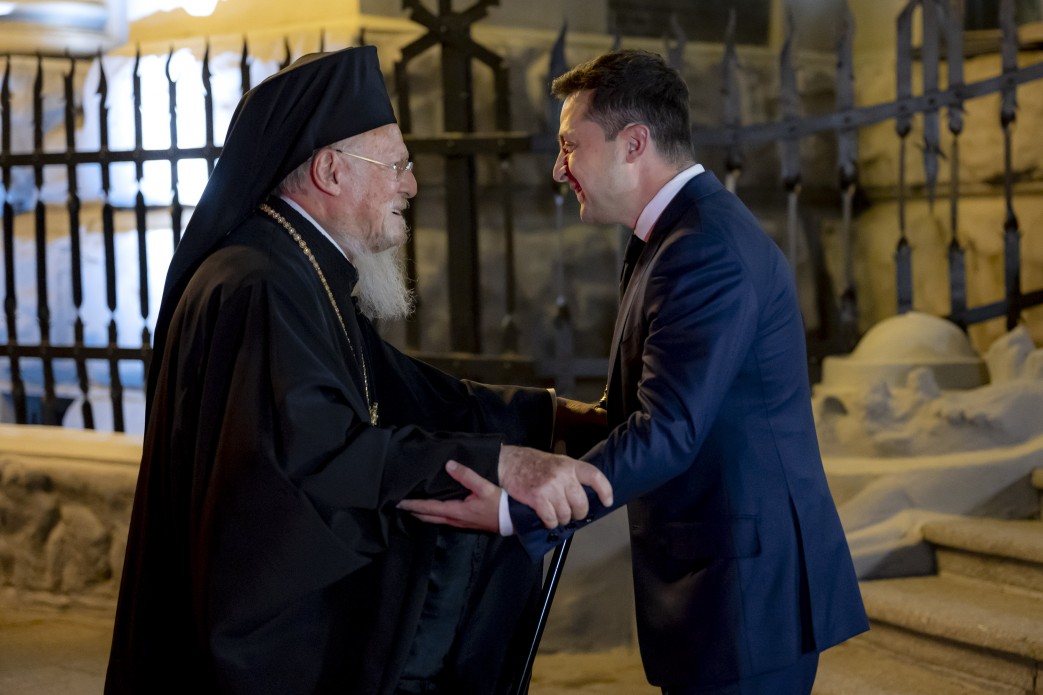
At the meeting, a protocol exchange of courtesies took place and some statements were made, which will be discussed below.
And the next day, August 21, 2021, Patriarch Bartholomew arrived at the Verkhovna Rada of Ukraine and met with its Speaker Dmitry Razumkov, who, according to the Constitution, is the second person in the state.
Thus, all three main leaders of Ukraine met with Patriarch Bartholomew, who is neither the head of any state, nor the prime minister, nor any other official. From a legal point of view, he is the head of a foreign religious organization and nothing more. Then why do all the chief leaders of the state meet with him? And in what capacity do they do it: as officials or privately? This last question can be answered unequivocally – as officials. This is evidenced both by the fact that almost all of these meetings were held in an official atmosphere on behalf of the state and, based on the results of these, as well as previous meetings, decisions of a legal nature were made.
Not only this visit but all cooperation between Ukraine and the Phanar is a political project that is being implemented by the Ukrainian government in violation of its own Constitution.
However, the Constitution of Ukraine, which describes the powers of the three highest officials of the state, does not mandate them appropriate powers, not to mention the fact that Ukraine is a secular state in which the Church is separated from the state. From this we can conclude that not only the current visit, but all cooperation between Ukraine and Phanar is a political project that is being implemented by the Ukrainian government in violation of its own Constitution.
The Ostrich pose: we see no conflicts, no protests
During a meeting with the Patriarch Bartholomew, President of Ukraine V. Zelensky stated that our country is "a unique example of the peaceful coexistence of many confessions". And this is said at a time when a wave of violent seizures of churches continues across the country, when believers are beaten, and hundreds of claims of the Orthodox communities of the UOC seek legal justice in courts, challenging illegal re-registration. There is obviously a religious confrontation in Ukrainian society, and it is quite tough. But instead of taking steps to pacify the society, to resolve the conflict, those in power prefer to simply close their eyes to the problem and declare that it does not exist. But this will not solve the problem, but only aggravate it even more.
On the evening of August 20, thousands of UOC believers lined up along the Boryspil highway with posters in Ukrainian, English and Greek, which say that:
- our Primate – Metropolitan Onuphry of Kyiv;
- believers demand from the Phanar head to come to the meeting;
- believers demand from the Phanar to correct what it has done in Ukraine.
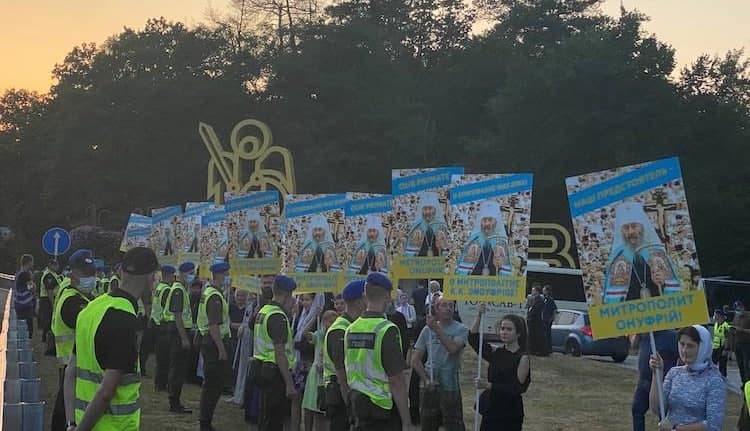
There were several such groups along the route of Patriarch Bartholomew’s cortege from the airport to Kyiv. And he could not help but see them. There were also huge banners on which believers invited him to a meeting.
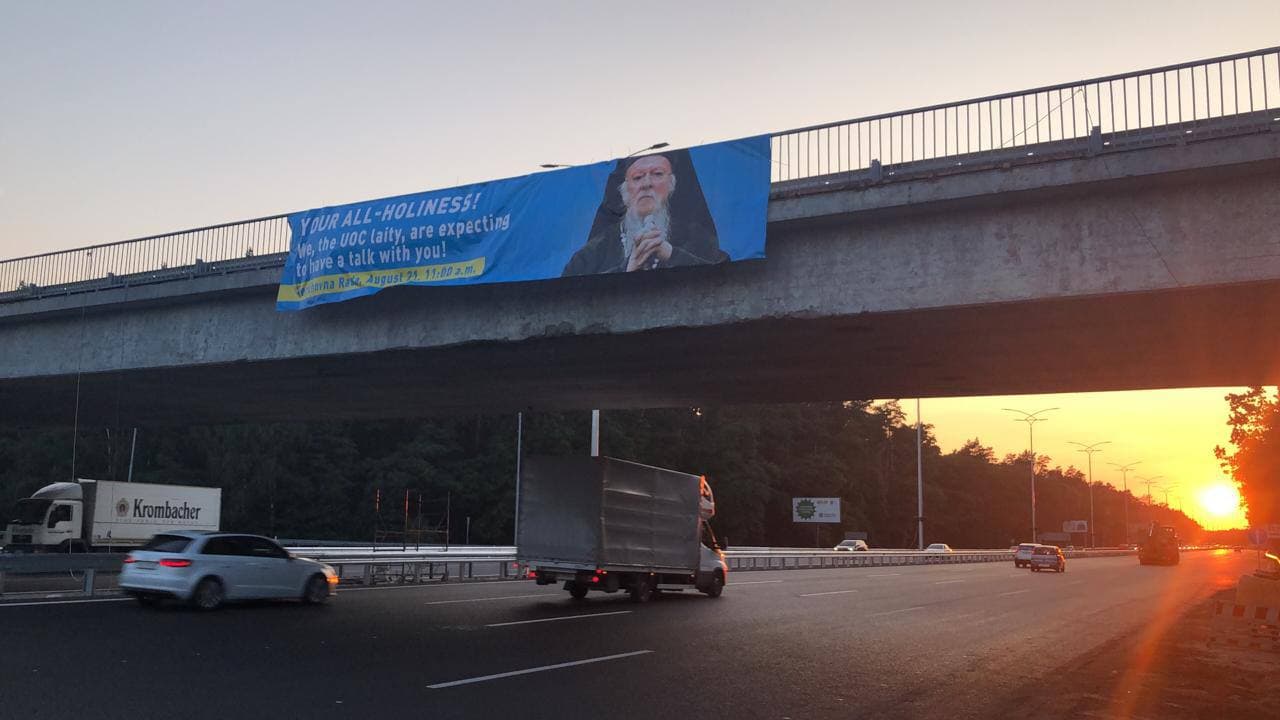
On August 21, at the time of the meeting of Patriarch Bartholomew with D. Razumkov, more than 10 thousand believers of the UOC gathered at the Verkhovna Rada. They came at the call of the NGO "Miriane" (“Laity”) to testify to faithfulness to the UOC and demonstrate to the Phanar head what his non-canonical intervention in the religious sphere of Ukraine has led to. Before the visit, the NGO “Miriane” sent an official letter to the Phanar inviting Patriarch Bartholomew to meet and personally make sure that the majority of Ukrainian Orthodox Christians do not agree to follow the decisions taken by the Ukrainian authorities together with the Patriarchate of Constantinople.

The day before the visit, some religious social networks gave information that Patriarch Bartholomew nevertheless intends to reach the believers of the UOC, but in reality it turned out differently. The head of the Phanar was brought to the Verkhovna Rada through the service entrance.
And this was done in the style of Hollywood action movies, in a matter of moments: when the cortege approached, the gates were opened and closed right behind the last car. In the same way, the head of the Phanar was "secretly" taken out of the Verkhovna Rada. Razumkov escorted him into the inner courtyard, where "His Holiness" was seated in a car, and in the same Hollywood style he was instantly taken away.
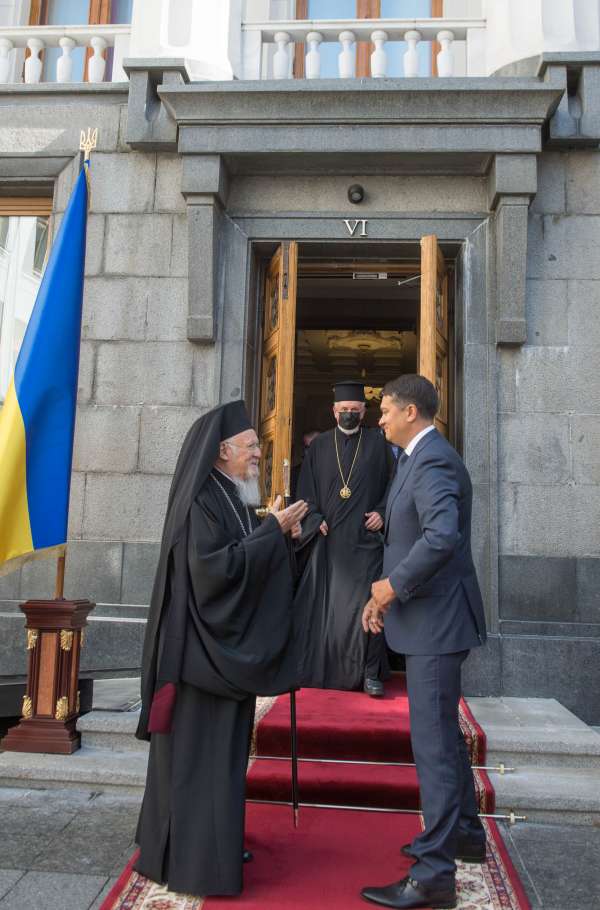
Thus, the Phanar head took, as he believes, a win-win position: I saw and heard nothing, I don’t know anything, which means that everything is fine in Ukraine, and I did everything right. And if the current events had taken place in the Middle Ages, such a version would have a right to life. But we are not in the Middle Ages, and any information instantly becomes known all over the world.
The Phanar head took, as he believes, a win-win position: I saw and heard nothing, I don’t know anything, which means that everything is fine in Ukraine, and I did everything right.
Patriarch Bartholomew arrived in Ukraine with his associates. One of them is Nikolaos Papachristou, director of the Press and Communications Department of Patriarch Bartholomew (yes, he has one). Before the visit, Papachristou gave a detailed interview to one of the OCU resources, in which he demonstrated an excellent awareness of the UOC believers’ protests against the actions of the Phanar, and, in general, the situation in church life of Ukraine.
Therefore, we absolutely do not doubt that Patriarch Bartholomew has the most complete information about the seizures of UOC temples, the number of participants in the Great Cross Procession, and, in fact, about the standing of the laity near the Verkhovna Rada, who waited for him for several hours to talk. Moreover, we dare suggest that the entry of Bartholomew's cortege into the Rada through the back door was made at his personal request so as not to “lose face”. But was the idea successful? Hardly.
“His Holiness” simply did not have the courage to look in the face of those people who were beaten, humiliated and expelled from their churches to force them to join the OCU project. Not everyone is able to honestly look at the results of their actions and bear responsibility for them, even if only moral one.
However, the next day, August 22, Patriarch Bartholomew hinted at the St. Sophia of Kyiv that he was ready to listen to the faithful of the UOC, but within the framework of a certain "consecrated church tradition". “We, as the Mother Church, are always ready to listen to problems, dispel doubts, heal anxiety, treat traumas with the grace of God of all our children but within the framework of a consecrated church tradition,” said Patriarch Bartholomew.
It should be understood that by "church tradition" Patriarch Bartholomew means that believers expelled by his grace from their churches should crawl to him on their knees, kiss his shoe and ask him to "dispel doubts". But they just have no doubts. They remain faithful to their Church, to their Primate, His Beatitude Metropolitan Onuphry, and are not going to sell their faith for thirty pieces of silver.
Does Patriarch Bartholomew have a persecution mania?
Even before arriving in Ukraine, the public was surprised by some, let's say, excessive precautions that were taken at rallies with the participation of Patriarch Bartholomew. We can still understand the fear of meeting with the believers of the UOC, where he would have to blush for his own actions, but many facts indicate that the Phanar head avoids and fears even his few supporters from the OCU – the very "beloved Ukrainian people" who he so often speak about.
Before the arrival of Patriarch Bartholomew in Ukraine, the OCU announced that it would not be possible to bring water, food and posters to the territory of St. Sophia’s Cathedral, where the service with the head of the Phanar was to take place on August 22. Many were surprised by these precautions, but this was only the beginning.
On August 21, Patriarch Bartholomew served the Vesper at St. Andrew's Church, the Stauropegion of the Patriarchate of Constantinople in Kyiv. During the service, the police completely blocked the Andreevsky Descent, where the temple is located. That is, even people who wanted to see “their Patriarch” and pray with him did not have such an opportunity. Accordingly, St. Andrew's Church was practically empty – there were only "hierarchs of the OCU", journalists and "VIP parishioners": Petro Poroshenko, Andrey Yurash, crime boss Alexander Petrovsky (nickname "Narik" – Ed.) and others. Of course, we cannot say that if the police had not blocked the Andreevsky Descent, ordinary parishioners would have come to the service of Patriarch Bartholomew, but there was such a chance.
If the Ukrainian people love Patriarch Bartholomew so much (and he loves the Ukrainian people) – why does he need so much protection, even at a divine service? Who is he afraid of?
On August 22, a joint "liturgy" of the Phanar head, Sergei Dumenko and other "hierarchs" of the OCU took place. As already mentioned, it was forbidden to bring water, food and posters there. People were allowed to enter the territory of the St. Sophia of Kyiv through metal frames (looking for weapons?). And the most interesting thing is that in the "altar" next to Patriarch Bartholomew there were several guards in suits and, for some reason, dark glasses. They stood out brightly against the background of people in robes and looked very comical. The question is - if the Ukrainian people love Patriarch Bartholomew so much (and he loves the Ukrainian people) – why does he need so much protection, even at a divine service? Who is he afraid of?
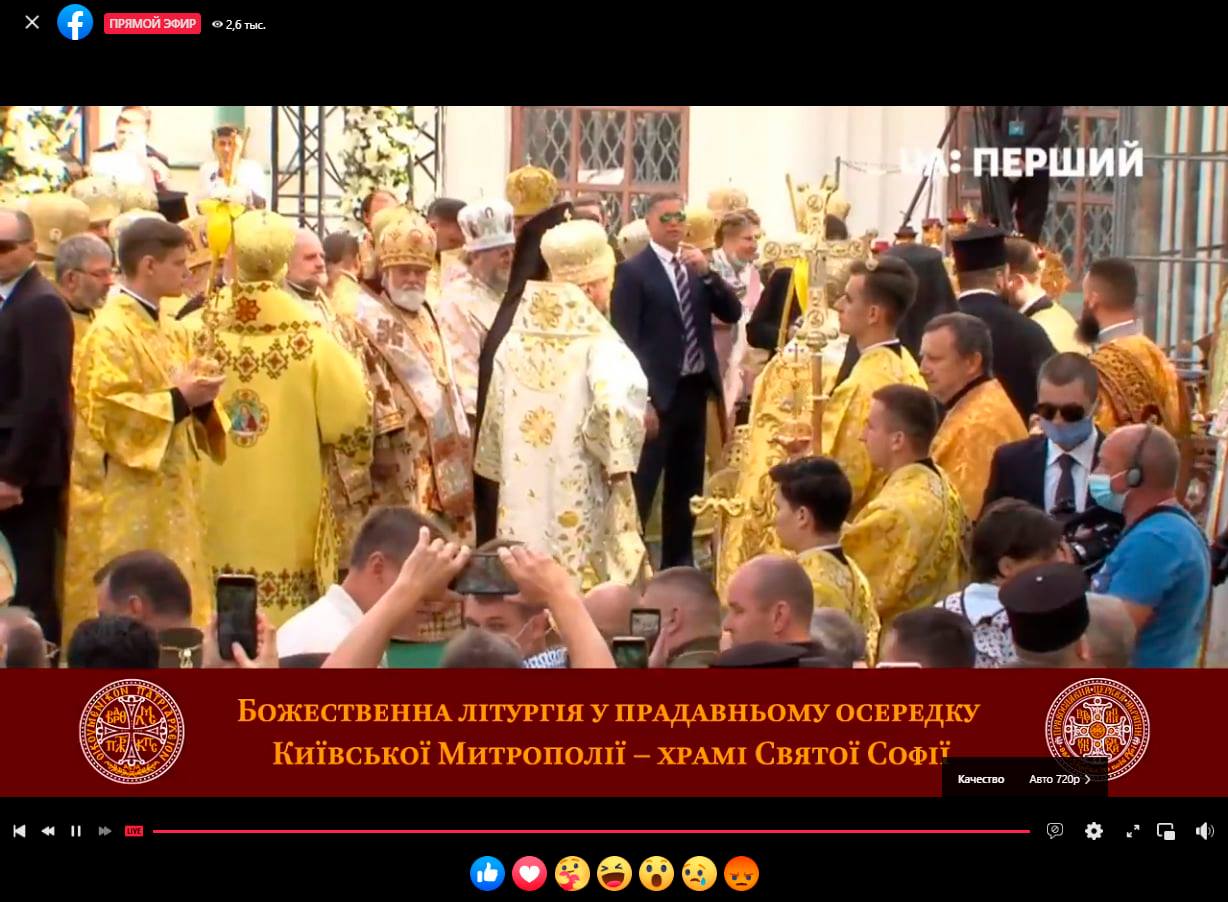
Persecution of the UOC to be continued
Unfortunately, the assumptions of many experts and analysts that the arrival of Patriarch Bartholomew in Ukraine may provoke a new wave of seizures of churches have every chance of being right. Believers of the UOC have been appealing to both the Ukrainian authorities and the Phanariots for quite a long time, demanding at least an assessment of the lawlessness and violence that the supporters of the OCU are doing. But instead, both the authorities and the Phanariots are actually in solidarity with the opponents of the UOC. At a meeting with Patriarch Bartholomew on August 20, V. Zelensky said that the religious factor is "one of the factors that the aggressor uses against Ukraine as a hybrid weapon", clearly hinting at the UOC. Patriarch Bartholomew, in an interview with Ukrinform on the eve of his visit to Ukraine, said that the Ukrainian Orthodox Church cares about foreign interests rather than church criteria.
Thus, both the Ukrainian government and the Patriarchate of Constantinople declared their negative attitude towards the UOC. And this is not just a negative attitude, but an approach, the essence of which was very succinctly expressed by the ancient Roman persecutors of Christians: "you shouldn’t be." The Phanar stated that the UOC no longer exists. Sergei Dumenko says that all parishes of the UOC belong to the OCU, and the Ukrainian government is trying to do everything possible to make it so. However, one should not forget that everything is in the hands of God. The truth of these words can be observed with our own eyes in Ukraine: the UOC lives and grows, and the OCU seeks support in government offices and from officials of the US State Department.
Sergei Dumenko in favourites
Recently, Patriarch Bartholomew has bubbled with compliments to Sergei Dumenko. In the same interview with the Ukrinform agency, he said that S. Dumenko is an effective leader who is trusted in Phanar. “Epiphany is a sensible primate who knows how to manage church affairs effectively and in the spirit of the canonical tradition of Orthodoxy,” said Patriarch Bartholomew. Having already arrived in Kyiv, he said that in decades, Ukrainians would glorify the name and example of S. Dumenko. “Your work will be hard, but in many decades your descendants will praise your name and your example. We got to know you as a man of action, as a God-fearing man, with unshakable faith in Christ, love for the Church and your homeland,” said the Phanar head.
Yes, for a normal person it all sounds absurd and even mocking. But this is not just diplomatic curtsy. This is a response to those “bishops” of the OCU who are trying to make their own game in the struggle for power in the OCU and, within the framework of this game, are looking for their own channels of communication with the Phanar. Now, these “hierarchs” have been given a clear signal – to sit and not doubt the abilities of an “effective leader”.
Patriarch Bartholomew is the creator of a new "reality"
In an interview with the Ukrinform agency, the head of the Phanar criticized the opponents of the Tomos of the OCU and said: “The problem of these people is that it is difficult for them to accept reality, or they refuse to acknowledge it. They are also ignorant of what autocephaly means, as well as the history and canonical practice of granting it." That is, Patriarch Bartholomew is trying to convince everyone that it is he, the head of the Patriarchate of Constantinople, who creates true "reality". And if what you see with your own eyes does not coincide with what the Phanar head says, you should believe him, not your eyes.
Patriarch Bartholomew is trying to convince everyone that it is he, the head of the Patriarchate of Constantinople, who creates true "reality." And if what you see with your own eyes does not coincide with what the Phanar head says, you should believe him, not your eyes.
For example, 10 thousand people who were waiting for him near the Verkhovna Rada on August 21, as well as those 350 thousand people who walked in the Great Procession – this is not a reality. His Beatitude Metropolitan Onuphry is also not a reality, as well as more than 12 thousand communities of the UOC – this is not a reality. But Sergei Dumenko, who does not have the priesthood at all, a person who calls the words of the Gospel proverbs is a reality. His few supporters, who did not even dare to hold a full-fledged religious procession on the Day of Baptism of Rus’, is also a reality. In his, "Bartholomew's" reality, only he, Patriarch Bartholomew, can grant autocephaly, and it does not matter whether he bestows it on schismatics or Orthodox Christians. And everyone who thinks differently is declared ignorant.
And on August 21, while at the St. Michael's Golden-Domed Monastery, Patriarch Bartholomew stated that the Phanar “was originally a reliable guardian of the good of the Church, and although at the time of its heyday and numerical strength, it could introduce and establish a pyramidal form of the Eastern Orthodox Church, it rejected this idea with disgust and did not deviate either from the ecclesiology given to it or from the "Pentarchy" system established and sanctified by the Councils".
First, the very wording of the question is interesting: "we could if we wanted." Here we again hear the assertion that one Greek bishop once expressed in plain text: "In Heaven, of course, the Lord is the head of the Church, but on earth the head of the Church is the Patriarch of Constantinople."
Do Phanariots seriously believe that they can arrange and rebuild the Church at their own discretion? All church history testifies to the fact that it is the Lord who governs this earthly, historical Church, and no "heyday and numerical strength" mean anything without the Providence of God.
Secondly, of course, Patriarch Bartholomew credits the Patriarchate of Constantinople that it did not formally subordinate the rest of the Eastern Patriarchates during the peak of the Byzantine Empire and the decline of Orthodoxy. But he says that ecclesiology was allegedly given to Constantinople, and therefore, it is this patriarchate that is its guardian. The statement is absurd since ecclesiology cannot be given to any one Local Church. The doctrine of the Church is one of the dogmatic elements of the Orthodox faith, without which this faith becomes flawed, and therefore not salvific. You cannot remain Orthodox and read the Creed without "I believe in One, Holy and Catholic and Apostolic Church". However, the Phanar is trying to convince everyone that the Patriarchate of Constantinople is the only guardian of Orthodox ecclesiology, and only it has access to "sacred knowledge" of how church affairs should be arranged.
Thirdly, the Ecumenical Councils did not establish or even consecrate the "Pentarchy" system. This system of the five most influential sees – Roman, Constantinople, Alexandria, Antioch and Jerusalem – was formed naturally under the influence of predominantly political factors. The Ecumenical Councils introduced some rules for regulating relations between these thrones, but they did not at all make the existence of these sees and territories, which were influenced by these sees, into some unshakable dogma. The conciliar rules simply described the then reality, although in fairness it must be said that both then and now there were people who argued that the Church could not exist otherwise than in the form of the five patriarchates. These people were sincerely perplexed when the Roman See separated from the Ecumenical Church and there were four patriarchates. By the way, when in 1589 the status of patriarchy was recognized for the Russian Church, the supporters of the “Pentarchy” saw in this the restoration of a shaken theory and claimed that Moscow had supposedly taken the place of Rome. Needless to say, all these theories and reasoning have no foundation in the New Testament and are, at best, an attempt to regulate interchurch relations in specific historical conditions.
Today, the so-called theory of the "Pentarchy" is rather a historical phenomenon, and not the modern structure of the Church and, of course, not an ecclesiological dogma. And to justify some special rights with this theory is nothing more than speculation on historical topics.
And fourthly, if we talk about the theory of the "Pentarchy", then it just does not imply the endowment of Constantinople with any exclusive privileges but recognizes the equality of the five patriarchates that existed in the first millennium. And if you go even further, and recognize the Moscow Patriarchate as one of the five patriarchates of the "Pentarchy", then in general it turns out that Constantinople is not right at all.
What comes next?
We dare suggest that if a new wave of seizures begins, it is unlikely to be large-scale. And this hope is based not on the "conscience" of the authorities, but on the strength of the Church. The flock of the UOC in the last year has become noticeably more active and organized in upholding their constitutional rights. The massive nature of the Great Procession, the ability to quickly gather tens of thousands of people for prayer meetings under the Verkhovna Rada and other government bodies, makes these very authorities think about the cost of continuing the anti-church policy.
On the one hand, it is quite obvious that, under the influence of the US State Department, the authorities returned to the anti-church policy of the former president. But on the other hand, everyone understands perfectly well that the mantras about the absence of interfaith conflicts in Ukraine are good only for diplomatic receptions, and in reality, attempts to put more pressure on the UOC will lead to an even more negative attitude of the Ukrainian society towards the current government with corresponding figures in the next elections. At the same time, it should be borne in mind that both the external and internal political situation is shaping up for the government rather unsuccessfully. On the subject of the Nord Stream 2 pipeline, both the United States and Germany have deceived Ukraine. Ukraine is being imposed the topic of "green energy", which threatens to finish off the remnants of our industry, as well as lead to an energy collapse. There is growing discontent in society about the sale of Ukrainian lands, which V. Zelensky legalized to please our Western partners (probably better to say, curators). A significant increase in tariffs for gas, electricity and utility bills has already been announced. Moreover, this increase may be such that it will put most of the population on the brink of survival. All these circumstances will play against the current government, and there is no need for one more additional factor in the form of a reaction to the anti-church policy.
And, probably, the main factor that will influence the policy of the Ukrainian authorities, and not only in the religious sphere, is a tangible decrease in the influence of the United States on world affairs. This was symbolized by the recent events in Afghanistan, where the Americans had to evacuate chaotically, and the Afghan citizens who served the United States faithfully were thrown at the mercy of the new Taliban. In many countries, a lot of politicians have seriously thought: is it worth so recklessly following the orders of the American administration, especially if these orders directly contradict both the interests of these countries and often the current legislation?
As for the Patriarchate of Constantinople, it goes further and further in its striving to assert its privilege and exclusivity in the Orthodox World. The Phanar, instead of looking for ways to retreat in the clearly failed OCU project, on the contrary, declares that this project is a "reality".
On August 22, at the St. Sophia of Kyiv, Patriarch Bartholomew said that it is wrong to call the Patriarch of Constantinople an anachronism and a museum exhibit. But if Phanar does not change its mind in the very near future, then it is possible that this will happen to it.











